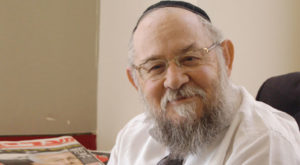Learning to Do Real

By the time Simchas Torah rolls around, we might have gotten the message
First, it was the Rebbe Reb Meilech.
There are many to whom 21 Adar in Lizhensk is sacrosanct. This year, when they couldn’t go, everyone else nodded along and said, “It was getting too much, we’re a pampered generation, you can find Hashem wherever you are you don’t have to go running to Eastern Europe.”
Then it was Reb Shayele, and the thousands of whom descend on Kerestir on 3 Iyar were despondent when COVID shut them out. But everyone else said, “This whole Kerestir thing was really getting out of hand, you can take a Tehillim in your living room and connect the same way, and anyhow, it’s the travel agents and tour operators who push these things.”
Then it was Uman, and people worried about losing their source of spiritual oxygen panicked, and the never-despair army acted out their rallying cry as a play in several scenes, and many of us squirmed and realized that we liked it better as the chorus of a geshmake song. Yeah, we know that Rabbeinu sha’ag bekol gadol ein shum yi’ush, but really, please act normal, Uman is just a place and Rosh Hashanah is not about a Ukrainian graveyard, it’s about crowning Hashem.
We shook our heads, because everyone is just so spiritually spoiled, needing their little experiences and highs just to feel something, anything.
Not like us, right?
But then, suddenly, we realized that many of us wouldn’t have the Rosh Hashanah we were used to either, sitting in precisely the same seat we’ve been sitting in for the last 20 years, that baal tefillah, doing the kevakaras the way we need him to… Maybe we were home or in a backyard, maybe we were in shul but miserable behind a mask — but at some point we realized that we’re also among the spoiled.
Everyone has their Kerestir, it turns out, and almost of all us were deprived to some degree this year of whatever it is, our spiritual charger, that key that allows our hearts to finally open.
I don’t know what the end will be, and no one — including the alternating cast of white-garbed wisdom dispensers who enjoy a few hours of WhatsApp relevance as they spout figures and gematrios vaguely sourced in Chazal — does either, but ◊It’s just us and Him.
The stuff we thought we needed and the stuff we were told we needed and the stuff we really didn’t need at all, but everyone else had it so our kids were embarrassed to be left out — none of it matters. What matters is that His children are still looking for Him, to Him. That we are finding ways, this generation of plenty, to exist even without the merchandise of Yiddishkeit, the gear and swag and click-here-to-get-yours.
A generation used to being enticed and won over by visuals and colors — even of the ruchniyus variety — is being forced to learn how to do “real,” and they’re rolling with it.
This period isn’t the metaphor but the thing itself. It’s happening.
And maybe that’s the point, not to replicate or channel or rely on, but to be.
I once read a joke in one of those old Jewish joke-books heavy in Yiddish humor, the kind that have a hundred pages of innocent-looking gags followed by that one joke that means you have to sigh and toss the whole collection in the trash. It described a shtetl Yid who made some money — enough money that he decided to invest in a new suit. He stood at the tailor proudly as they measured him. He came back for his fitting, and then walked out, head held high as he walked through town in his new suit.
On Erev Yom Kippur, he went to the mikveh, and he had a quandary: to take off the suit would mean losing his identity, but a person can’t be toivel in a suit. He decided to tie a thread from the suit around his big toe, so that he would remember who he was, even when the suit was hanging on a hook — he was the man who owned that tailored suit. He approached the water, the thread firmly in place, but as he went under, it slipped off. He came up for air and noticed the thread was gone, and it had slid around the toe of another person, a simple blacksmith.
Baffled, he looked at the blacksmith. “Now I know who you are,” he said slowly, “but who am I?”
Maybe this year’s succah decoration of choice isn’t the simulated Yerushalayim or Rav Chaim’s face glowing brighter than the esrog in his hand — but you, in your succah, eating a kezayis, soaking up a holiness created by you, not someone else.
Maybe your Simchas Beis Hashoeivah won’t include a VIP seat from which you can watch gold-kaftaned Yerushalmis kicking up legs at impossibly graceful angles that awaken nostalgia and remind you of your spiritual moments, back when you used to “feel.” But maybe that moment is now, and maybe the music is you, trying to create a matzav with your children by playing Monopoly since the usual Chol Hamoed center/plex/opolis is closed.
Who knows if this Simchas Torah will have the hakafos you’re used to, the kiddush you’re used to, the heightened moments when you think you just might be feeling spiritual joy and hey, is this what they call dveikus?
But if you see a sefer — any sefer, for has not the knowledge within, the Divine Word, proven stronger, more enduring, and more relevant than anything else, especially in recent months? — you can grasp it and dance as you hold it close.
And if you see a bochur — any bochur, for has not his determination and longing, the light in his eyes and quiet pride in his role, even with the inevitable challenges and bumps in the road and disappointments, amazed you? — rejoice in him as well. While college deans dithered and school boards flip-flopped, rebbeim and talmidim found ways to connect, to build worlds, to sit together even if, in many cases, it meant they couldn’t leave their little islands. No Thursday night cholent, no shopping, no ball-games in the park — if there would be Torah, there could be nothing else — and they chose it just the same, these boys, carrying the torch further.
If you see a Yid, elbow-bump him, too, because when the rest of the world froze, not sure what was too much and what was too little, too open and too closed, the Jew was worried about the right zeman, the right shiur, the right brachah, the million details that must be precise and accurate to live within creation according to will of its Creator.
Maybe we can be a little less like the shtetl Yid looking desperately to the suit on the hook and grasping for an identity, and this zeman simchaseinu, experience the simple joy of letting whatever is out of reach just hang there as we get to revel in discovering who we really are?
Originally featured in Mishpacha, Issue 830. Yisroel Besser may be contacted directly at besser@mishpacha.com
Oops! We could not locate your form.








